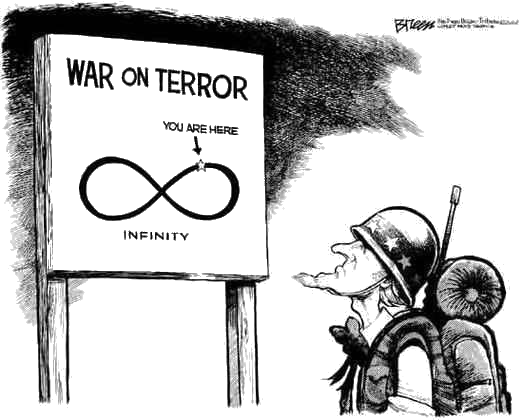Let’s get something straight about the 2nd Amendment that has little to do with personal protection or fighting off an ungoverned government:
The second amendment is about citizens taking PERSONAL responsibility for violence! Citizen militias are much, much less likely to reelect warmongers and meddle with other people’s countries. And we willingly, anti-constitutionally, surrendered our militia system in 1903 to build a professional, global, war machine. …Just what our founders warned us to never, ever do.
The USA Constitution‘s Article I, Section 8:15 does grant Congress the rather scary authority, “To provide for calling forth the Militia to execute the Laws of the Union, suppress Insurrections and repel Invasions.”
Politicians (including judges) apparently stop reading here, thinking this grants the federal government essentially total military power and authority over everything, including you; you uppity citizen.
Article I, Section 8:16 further grants Congress authority “To provide for organizing, arming, and disciplining, the Militia, and for governing such Part of them as may be employed in the Service of the United States, reserving to the States respectively, the Appointment of the Officers, and the Authority of training the Militia according to the discipline prescribed by Congress.”
This is considerable power over militias, but look at the delimiter, “…governing such Part of them as may be employed in the Service of the United States…” (bold is my added emphasis)
That should make us think about what the state constitutions say about the “Part of them” not governed by the feds, but we’ll get to that shortly.
Article I, Section 10:3 provides enough confusion in today’s context that, without the state constitutions, you might get the wrong idea about militias: “No State shall, without the Consent of Congress… keep Troops, or Ships of War in time of Peace …or engage in War, unless actually invaded, or in such imminent Danger as will not admit of delay.”
If you can’t “keep Troops” in peace time, how could a state respond to invasion or other imminent danger?
Article II Section 2 should provoke some thought, though: “The President shall be Commander in Chief of the Army and Navy of the United States, and of the Militia of the several States, when called into the actual Service of the United States.”
So, the POTUS is NOT the CIC of the militias until an actual declaration of war by the US Congress. The militias aren’t “federalized” until an actual declaration of war by the US Congress. And an actual declaration of war by the US Congress hasn’t happened since WWII.
Again, this won’t make proper sense without state constitution context.
So, for Indiana, for example, the Indiana Constitution’s Article 5, Section 12 is where things ought to start coming together: “The Governor shall be commander-in-chief of the armed forces, and may call out such forces, to execute the laws, or to suppress insurrection, or to repel invasion.” (again, boldface is my emphasis, but you really ought to be raising your eyebrows now. This is even as amended in 1984. This is still law!)
Here’s Article 12, Section 1 of the Indiana Constitution, which was amended as recently as 1974:
“A militia shall be provided and shall consist of all persons over the age of seventeen (17) years, except those persons who may be exempted by the laws of the United States or of this state. The militia may be divided into active and inactive classes and consist of such military organizations as may be provided by law.”

OK, there it is, Hoosiers. I’m supposed to be in the militia, arthritis and all. So are you. Anybody over 17, unless a conscientious objector or otherwise excluded by law, is the militia. We are constitutionally to be more like Switzerland, where kids learn gun safety early on, and everybody plays a part in the defense of the Canton/County, state and nation. And we used to be until around 1903. Even more recently, kids still learned gun safety…in public schools!
So, now, still, by law, you are supposed to be trained in the use of weapons, as a militia member, including the sort of weapons that’d make Nancy Pelosi scream, as in Indiana’s Article I Section 32, “…for the defense of themselves and the State.”
(This is why, dammit, you have to read both your state and federal constitutions to get the whole picture when it comes to anything having to do with politics.)
There’s more, of course, but I need to get to the point:
We’re not doing any of this at all, and we need to. Pronto.
…Why, you may ask?
I’ll repeat this because it’s important:
 Without going into how, why or when we became a global empire of fear and aggression, I want to as quickly as possible, and by big steps, nullify this self-destructive mess, and enforce/invoke/do the constitutions, as written; to restore our freedom, prosperity, opportunity, justice and security, for all.
Without going into how, why or when we became a global empire of fear and aggression, I want to as quickly as possible, and by big steps, nullify this self-destructive mess, and enforce/invoke/do the constitutions, as written; to restore our freedom, prosperity, opportunity, justice and security, for all.
I want to stand down our professional, global, permanent war industry. That would not only reduce the obvious blowback of constantly blowing up other people’s countries and people and wedding parties, it would make us more secure here at home.
And a lot richer!
We could afford to actually keep the promises we make to our soldiers in both regular and “National Guard” ranks. We’ve currently no way to keep up with the escalating costs of medical care and pensions. Not until we massively cut our global monstrosity of destruction, and return our military to its proper role and structure in national defense. Real national defense.

I want kids to learn about both the danger and proper use of weapons. That would not only raise up a nation better able to defend itself, it would also greatly reduce the irresponsible, stupid accidents, and unchecked violence in places like Chicago (where guns are essentially illegal and therefore ubiquitous in all the wrong hands) we now suffer.
And I want our armies out of the control of all the wrong people. You know that our government sold out. If you’re reading this, you probably know a good part of our global weaponry is unleashed in service to our financial sector’s fiat currency scams, the “petrodollar” scheme, the CIA (which I’d like to kill, gut and mount on the wall as a warning to future generations that we must never allow such a thing again) and the military industrialists we were warned about by a dozen USA Presidents.

There’s nothing civilized about delegating away all our violence and acting like it’s right. The damage we do to our own children’s lives, minds, bodies, careers and family lives, just to soothe our trembling nerves, is both embarrassing, and sin.
Putting this right would be a major part of making our government go legit, at long last, with world peace a possible side effect.
Would that be so bad?
It’s our decision. We can make this next Election Day a peaceful revolution to finally make good on the dreams of 1776. Please think on it.

 I’m a little up-to-here with those who deify Thomas Jefferson, and who’ve never even heard of George Mason. Without Mason, American may have never had the three-branched and separated federal powers; and there’d have certainly been no
I’m a little up-to-here with those who deify Thomas Jefferson, and who’ve never even heard of George Mason. Without Mason, American may have never had the three-branched and separated federal powers; and there’d have certainly been no